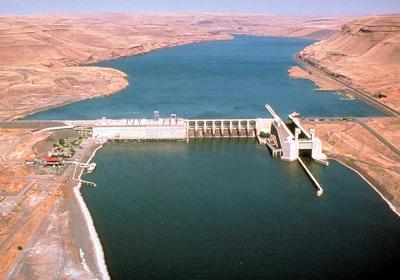https://www.capitalpress.com/ag_sectors/water/ag-stakeholders-reject-white-house-draft-reports-on-dam-breaching/article_e9ec0816-022e-11ed-b78a-ffd447b94013.html?utm_source=newsletter&utm_campaign=daily-capital-press-newsletter&utm_medium=email&utm_content=read%20more
Ag stakeholders reject White House draft
reports on dam breaching
July
13, 2022

Agricultural industry representatives
have roundly criticized a pair of White House draft reports
on breaching four lower Snake River dams, saying the
documents fail to consider the greater impact on the
environment and the economy.
According to the "Rebuilding Interior
Columbia Basin Salmon and Steelhead" draft report, actions
with the highest potential to achieve "midrange abundance
goals" for salmon recovery include significant reductions in
direct and indirect mortality from mainstem dams, including
breaching one or more lower Snake River dams.
Another study, titled “BPA Lower Snake
River Dams Power Replacement Study,” weighs power production
scenarios and costs associated with replacing the electrical
power from the four federal dams on the Lower Snake River,
"in the event Congress were to authorize such an action."
That study offers "two scenarios that
assume that emerging energy technologies become commercially
available," and finds replacing the energy and grid services
provided by the dams is "possible," predicting a cost
ranging from $11 billion to $19 billion.
The study was conducted with
significant input from two plaintiffs in the federal lawsuit
seeking dam breaching, said Heather Stebbings, executive
director of the Pacific Northwest Waterways Association.
The report examines replacing
hydroelectricity benefits associated with the dams, but
contains no mention of impacts to agriculture or the
transportation network, Stebbings told the Capital Press.
"The idea of breaching the dams on the
Lower Snake River would have a devastating economic impact
on the livelihood of wheat growers beyond the PNW," Nicole
Berg, Paterson, Wash., wheat farmer and president of the
National Association of Wheat Growers, said in a NAWG press
release. "NAWG has serious concerns about these reports and
encourages the administration to engage with the
agricultural industry because breaching these dams will
adversely impact wheat growers who are already facing
economic pressures from inflation and lingering supply chain
issues.”
The Columbia Snake River System
enables reliable wheat transportation to more than 20
countries around the Pacific Rim, according to NAWG.
“According to the report commissioned
by the Biden administration’s BPA, Snake River dam removal
would force ratepayers to gamble $75 billion or an increase
in carbon emissions against technology that is not yet
available," Kurt Miller, executive director of Northwest
RiverPartners, said in a press release. "We all want
emerging technologies to be viable, but we cannot bet our
climate and the health and safety of our region on something
that doesn’t yet exist."
The report estimates that dam
replacement without any emerging technologies — hydrogen,
advanced nuclear and carbon capture — would require
additions of 12 gigawatts of wind and solar energy at $42
billion to $77 billion.
In a press release, Idaho Gov. Brad
Little said he has been clear in his opposition of dam
breaching because it's not a silver bullet for salmon
recovery.
“It is disappointing the Biden
administration would release any report on dam breaching
that does not take into account Idaho’s considerations in
the Columbia Basin," Little stated. "If Biden is truly
interested in identifying broadly supported solutions, I
would encourage his administration to look at the 20 months
of work our diverse Idaho Salmon Workgroup put into
identifying 29 solutions that support salmon, our economy,
and thriving communities."
"Only Congress has the authority to
order the dams to be removed," said Sean Ellis, a spokesman
for the Idaho Farm Bureau. "The president can have his own
opinion on the matter, but Congress will be the one
deciding."
Stebbings doesn't think Congress is
willing to take up the concept of breaching the dams. The
latest study "provides just a tiny piece of the pie," she
said,
In the 2020 "comprehensive" federal
environmental impact statement, dam breaching was not
recommended, she noted.
Stebbings cited the impacts upon the
environment of removing the dams and their hydropower, and
replacing barging with rail and trucks.
"Removing the dams is a step backwards
in the fight against climate change," she said.
The draft report will be transmitted
to all state and tribal fish managers in the region for
their review over the next 30 days, according to the White
House Council on Environmental Quality.
"While the administration has not
endorsed the Columbia Basin Partnership Task Force’s goals
at this time or the particular actions identified in today’s
draft science report, it is carefully considering this
information and ongoing regional efforts as it assesses
long-term pathways for the Columbia River basin," the CEQ
said in a press release.
====================================================
In accordance with Title 17 U.S.C.
section 107, any copyrighted material
herein is distributed without profit or
payment to those who have expressed a
prior interest in receiving this
information for non-profit research and
educational purposes only. For more
information go to:
http://www.law.cornell.edu/uscode/17/107.shtml |

